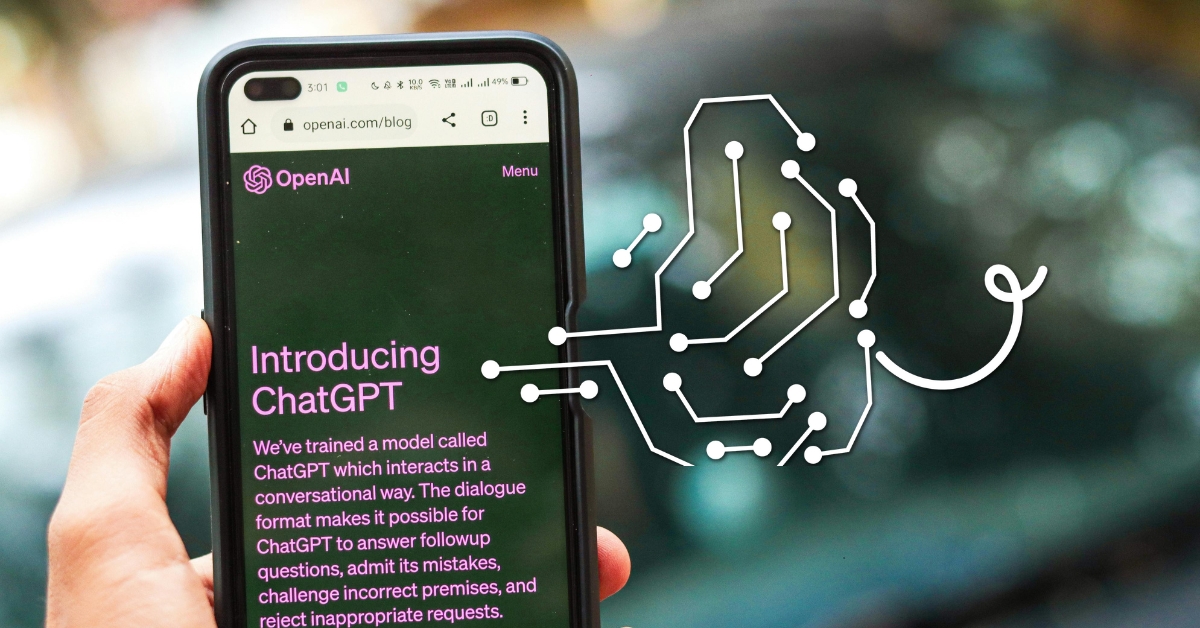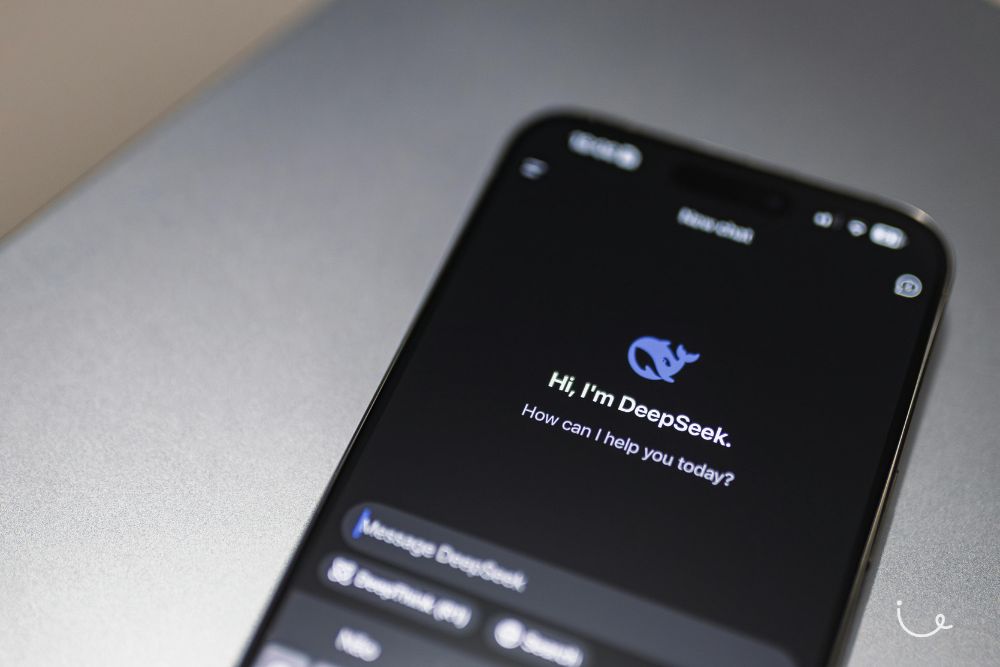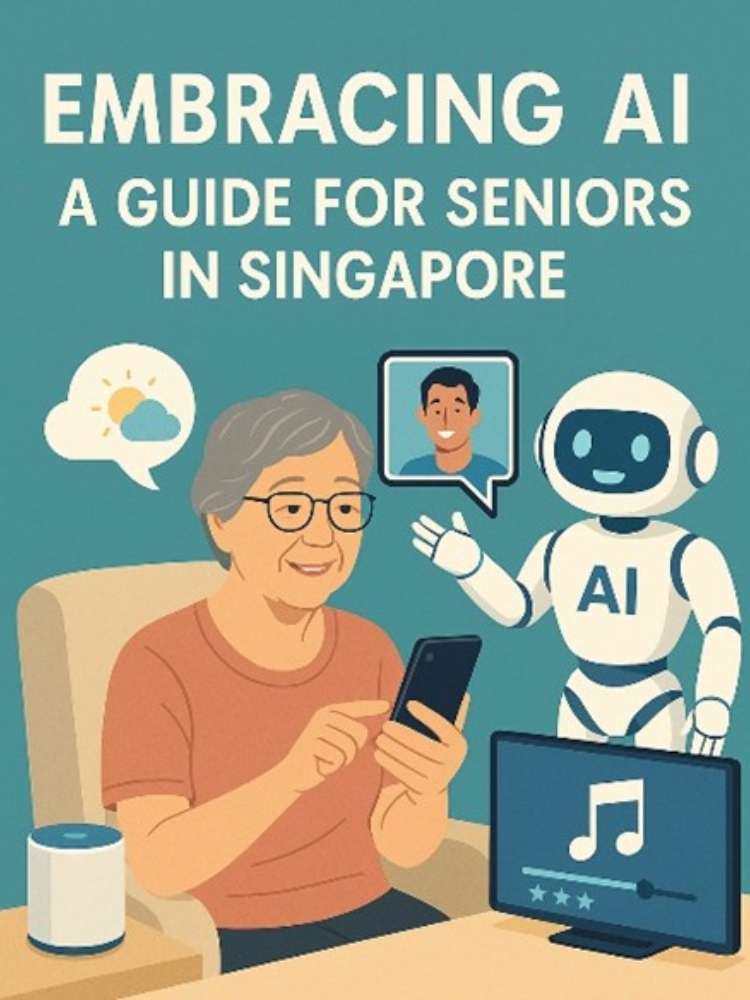
Artificial Intelligence – better known as AI – sounded like something out of a science fiction movie, until it wasn’t.
Whether it’s a voice assistant giving you a weather update, a smart device reminding you to take your medication, or the recommendations on your favourite streaming service, AI is quietly working behind the scenes to make daily routines smoother, safer, and more convenient.
The fascination with intelligent machines isn’t new. It first captured imaginations in the 1927 film Metropolis, where a robot version of the character Maria both amazed and unsettled audiences.
Nearly a century later, AI has moved from the movie screen into our homes, healthcare systems, and communities – including right here in Singapore, where it was recently announced that Home Team Singapore would be progressively rolling out AI-powered humanoid robots to fight fires, help with search and rescue and handle hazardous materials.
Yet, learning about AI isn’t just about keeping up with the latest tech – it’s about discovering tools that can support your lifestyle, offer peace of mind, and help you stay connected, independent, and engaged.
Advertisement
AI in plain sight: The helper you didn't know you had
Ever wondered how Netflix or Apple TV always seems to know exactly what to recommend next? Or how Spotify, Tidal, or Apple Music manage to create playlists that match your mood perfectly? That’s AI at work behind the scenes.
These platforms use AI to curate your recommendations based on what you watch, skip, rewatch, or listen to. In fact, they even know what thumbnails are most likely to hook you in – that’s how powerful it is.
On the less-insidious note, many modern TVs like those from Sony, Samsung and LG now come with built-in AI features that automatically adjust brightness, contrast, and audio playback based on your surroundings.
Voice assistants like Siri, Google Assistant, or Alexa let you speak commands instead of typing. With just your voice, you can check the weather, set reminders, play your favourite music, or even ask for a joke when you need a lift.
When you reach out to your bank or the CPF Board online and get an instant reply, chances are you’re speaking with an AI-powered assistant.
These virtual helpers are designed to answer your questions clearly and efficiently, saving you time, effort, and often a long wait on the phone. If the question gets too complex, most systems will smoothly connect you to a human officer, so you still get the help you need.
AI in your phone

Your smartphone is one of the most powerful examples of AI in action. From unlocking your phone with facial recognition to getting directions from apps like Google Maps, AI is helping you get things done more easily and securely.
AI features have been available with the likes of the Samsung Galaxy and Google Pixel for quite some time, but notably, not the iPhone – at least until last year, when Apple finally caved into AI mania with the stubbornly on-brand release of Apple Intelligence.
Anyway, one area where AI for smartphones truly shines is mobile photography. It can automatically detect what you’re photographing – be it a smiling face, a sunset, or your favourite dish – and instantly adjust lighting, focus, and colours to bring out the best in every shot. It can even suggest the perfect moment to press the shutter or remove unwanted background glare (or people!).
Other AI-powered features on your mobile phone include Apple’s Live Text and Google Lens- tools that can turn your camera into a smart assistant.
Just point your phone at any printed text, and you can instantly copy the words, translate them into another language, or search the content online. These features are especially helpful when traveling to non-English speaking countries, making it easier to navigate menus and signs without needing a separate translation app.
This even goes for real-life items. Just point your camera at that unfamiliar vegetable at the market, or the beautiful bird in the sky, and Google Lens can identify it in seconds. You can even scan barcodes or landmarks to learn more about products or places around you.
Meanwhile, smartwatches and fitness trackers like the Apple Watch, Fitbit, or Samsung Galaxy Watch go far beyond counting steps. They monitor your heart rate, track your sleep, remind you to move, and even detect falls or unusual heart rhythms. These features can offer early alerts and helpful data that support your health goals or assist with managing chronic conditions.
AI in Singapore: Shaping Senior Living

Singapore’s Smart Nation initiative has quietly woven Artificial Intelligence (AI) into daily life. The government’s vision is clear: harness smart technology to make life more convenient, efficient, and inclusive for all.
The MyCareersFuture portal uses AI to match job seekers with suitable roles. Even SingPass, Singapore’s national digital identity system, now uses AI-powered facial recognition to make logging into government services faster and more secure, whether you’re checking your CPF, accessing banking, or renewing your passport.
Healthcare is another area seeing rapid AI integration. Hospitals like Tan Tock Seng Hospital and Changi General Hospital use AI to analyse X-rays and medical scans, aiding early diagnosis. Clinics increasingly use AI chatbots to handle appointment bookings and answer basic health queries, reducing wait times. Platforms like Doctor Anywhere and WhiteCoat use AI to triage symptoms before connecting users to doctors, thus improving access and care delivery.
Further examples include the CHAMP programme, which uses an AI chatbot to manage chronic conditions like hypertension. More than 10,000 people have signed up, with participants reporting improved outcomes like lower blood pressure and reduced cardiovascular risk. In 2025, features like blood sugar tracking and personalised lifestyle nudges are being introduced to further enhance health support.
The non-profit Lions Befrienders Service Association is even piloting new voice-based AI systems to amplify the efforts of care staff. These systems mimic empathetic speech when speaking to seniors living alone, potentially reducing loneliness while searching for signs of distress or need.
Exciting New AI Technologies for Seniors

For seniors who love to explore but find travel challenging, AI-powered virtual tours offer a window to the world. Apps like Google Arts & Culture let you “walk” through famous museums and heritage sites guided by AI-generated commentary.
But AI doesn’t stop at virtual travel. In fact, it’s an awesome helper when planning real trips. Platforms like Google Travel, TripIt, and Kayak can recommend destinations, track flights, suggest activities, and alert you to weather changes or delays. Apps like Hopper even predict the best time to book flights and hotels to help you save money.
Creativity is another space where AI shines. You can now write your life story, letters, or even create digital artwork with the help of AI. ChatGPT can help organise your ideas, improve grammar, and guide you through writing projects like memoirs or thank-you notes.
Perplexity and Deepseek are great for brainstorming and structuring content. For visual creativity, Midjourney allows you to generate artwork simply by describing a scene. For example, “a sunflower in a glass vase by the window.” Be specific and clear with how you’d like to weight, or bias, your prompts – these can lead to entirely different results, hence the emerging field of “prompt engineering”.

Searching online has also become much simpler thanks to AI-enhanced tools. In the past, asking a question like “How do I grow orchids in Singapore?” meant scrolling through multiple websites and forums.
Today, smart tools like Google’s Search Generative Experience (SGE) and Perplexity AI summarise the best information from multiple sources and give answers right away.
Do double-check sources and info presented though – AI has been known to hallucinate information that’s imprecise, or just plain wrong.
AI and You: Where seniors can learn more about AI in Singapore
Getting started with AI doesn’t have to be overwhelming. There are many senior-friendly resources in Singapore to help you learn at your own pace, build confidence, and have fun along the way. The Infocomm Media Development Authority (IMDA) has expanded its “Digital Skills for Life” framework with new workshops on generative AI (GenAI) designed for seniors, covering tools like chatbots, voice assistants, and AI art.
Public libraries under the National Library Board (NLB) also host hands-on AI showcases where seniors can explore these tools in a supportive environment with guidance from digital ambassadors. Here are some courses to look out for:
- Learn through courses made just for seniors
The IMDA runs the popular Silver IT Fest, offering hands-on digital literacy workshops tailored to seniors. You’ll find sessions on smartphone basics, safe internet use, and even AI-powered tools like voice assistants and translation apps. You can also tap into SkillsFuture credits to attend tech-related courses that include introductions to AI, many of which are taught in a relaxed, beginner-friendly environment.
- Join workshops at your local community centre or library
Community centres (CCs) and public libraries frequently host free or low-cost digital literacy workshops. These often include how to use apps, AI features in smartphones, and tools like ChatGPT. To find one near you, visit People’s Association’s OnePA portal or check NLB’s programme listings.
- Explore online courses from anywhere
If you prefer learning from the comfort of home, beginner-friendly online courses like Google’s “AI for Everyone” or Coursera’s AI for Beginners courses are a great place to start. These break down big ideas into easy lessons, often with subtitles and visual guides to support different learning styles.
- Get personal help when needed
If you run into any tech troubles, organisations like RSVP Singapore and TOUCH Community Services offer help via friendly tech helplines and volunteer digital ambassadors. Whether it’s setting up a phone or learning to use an AI assistant, help is just a phone call away.
AI Safety and Ethics

As artificial intelligence becomes more integrated into our daily lives, it’s natural to have questions about safety, privacy, and trust.
Singapore is addressing these concerns head-on through proactive governance, regularly updating its Model AI Governance Framework to ensure AI is used transparently, ethically, and with special consideration for vulnerable groups like seniors.
This framework lays out clear guidelines on how AI should be deployed particularly in healthcare, caregiving, and public services to ensure fairness, accountability, and safety. Importantly, seniors are being invited to participate in the design, testing, and feedback process for new AI tools, helping ensure that these technologies serve their needs without compromising autonomy or dignity.
Privacy remains a key concern. Whether you’re using a health-monitoring app, AI-powered chatbot, or smart home assistant, it’s important to understand who is collecting your data and what they’re doing with it.
Another growing concern is the rise in AI-generated scams and misinformation. AI can now be used to create fake voices, pictures and even videos, making it easier for scammers to impersonate trusted people – including our former Prime Minister, Lee Hsien Loong – and institutions.
To combat this, government campaigns and platforms like ScamAlert.sg offer timely information, real-life examples, and tips on how to identify and avoid fraud. Nevertheless, the buck stops with us: Stay vigilant, spot suspicious messages, and take action when something doesn’t feel right.
There are also broader ethical concerns around AI replacing human jobs, reinforcing social biases, or being overused in education and workplaces. These are valid and important discussions. In many cases, AI doesn’t replace people or human thinking, but supports them, allowing more time for human interaction and creativity. As with any tool, it’s all about how you use it.






